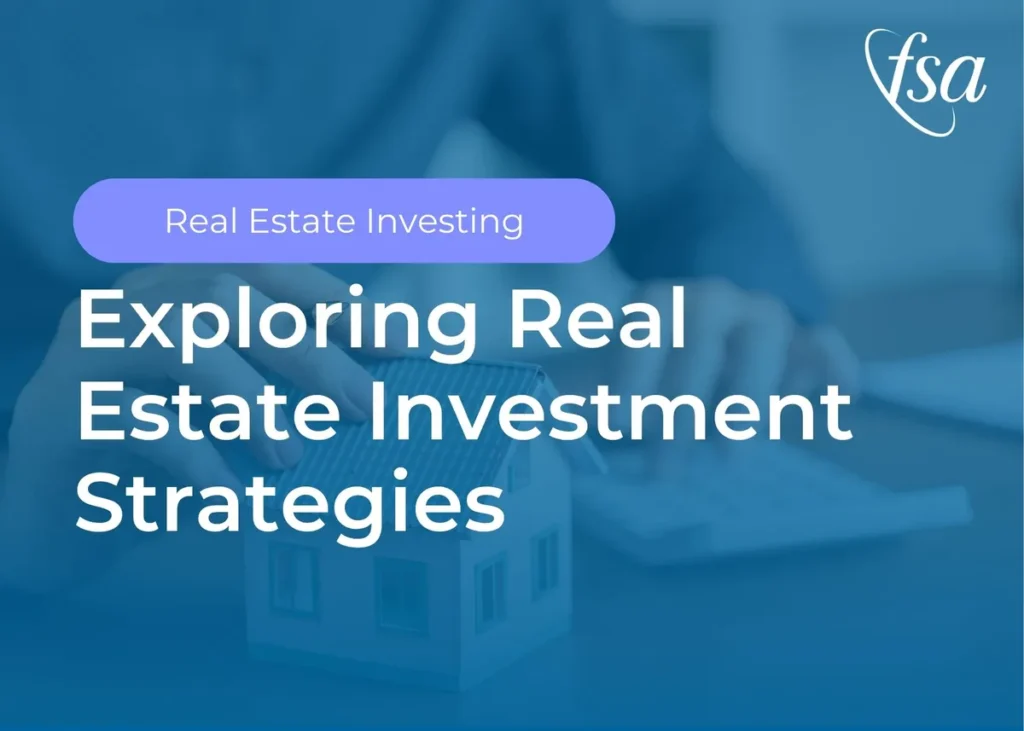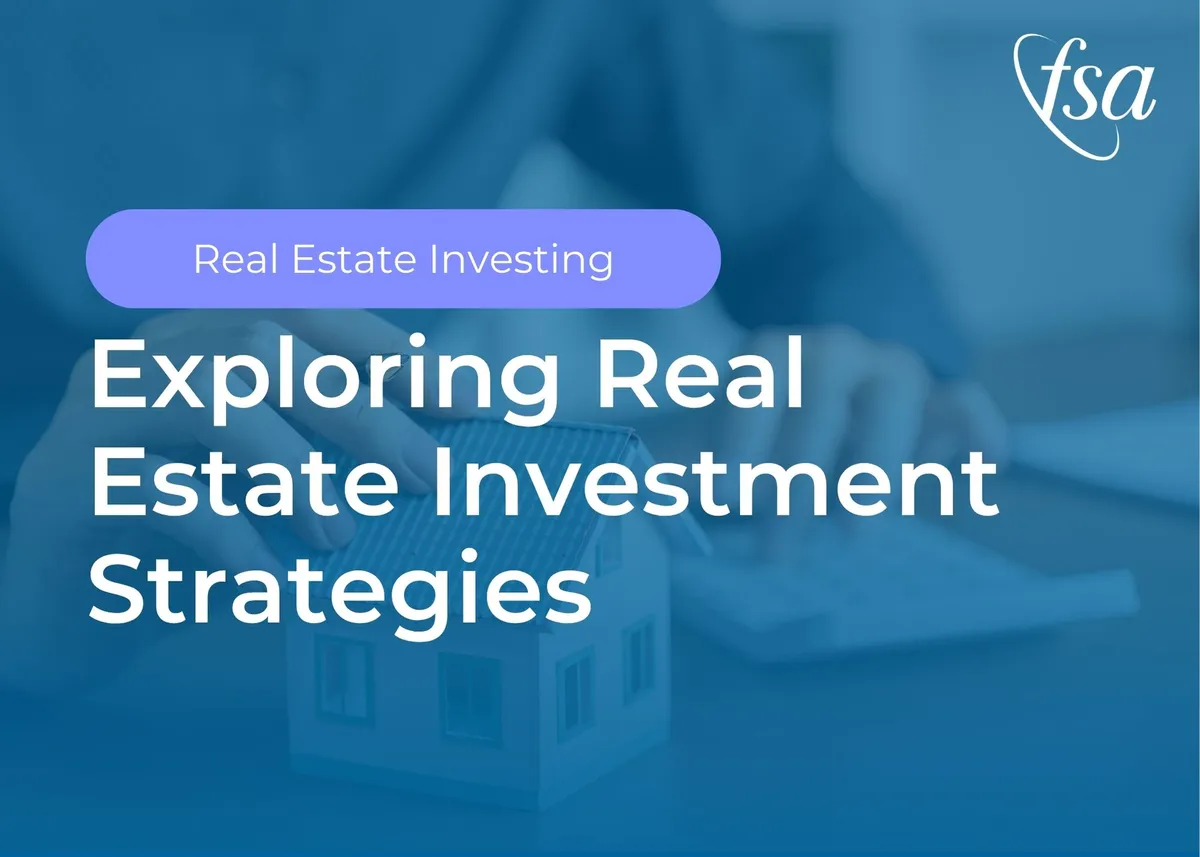By Jim Joseph, CFP®
Investing in physical real estate is a time-tested method of building long-term wealth and properly managed, profitable real estate investments offer the potential for steady income, asset appreciation, and tax benefits.
As with any other investment, however, there are advantages and disadvantages, as well as potential pitfalls to avoid. The financial media is filled with DIY real estate courses that promise riches from acquiring and owning properties. But seasoned investors know there’s more behind the curtain.
At FSA Wealth Partners, we understand the importance of thorough due diligence before committing to any investment and, adhering to our FSA Safety Net philosophy, we believe this type of thoughtful approach can work well when considering real estate.
Let’s look at some of the pros and cons.
The Pros
- Diversification: Physical real estate has a low “correlation” to other investments, such as stocks, bonds, ETFs, or mutual funds, since the factors affecting real estate value and prices often have little to do with day-to-day publicly traded market activity. Though the real estate market is somewhat cyclical, property values tend to be much more stable.
- Control: By owning physical property, you have much more control over the finances and operations of your investment. “You are the boss,” unlike being a (very) passive minority owner of the common stock of some large corporation.
- Appreciation: Though not guaranteed, with a careful purchase and maintenance, real estate generally has potential for gradual but solid appreciation over the long term.
- Tax benefits: The U.S. tax code has numerous tax incentives to own property, especially investment property. Depreciation, mortgage interest, expenses, and maintenance costs are all deductible against rental income for tax purposes. Gains in value are not taxed until the property is sold and (if over the long term) are taxed at lower rates than at most ordinary income brackets.
- Potential for steady income: Investing in rental real estate offers steady income (after expenses), provided the tenants themselves make their rental payments. While taxable after deductions, the net income can be used for further investment or other purposes.
The Cons (or Pitfalls)
- Property management: While “You’re the boss” sounds good in theory, it also means the investment is a “hands-on” endeavor, whether you manage the property(s) yourself or pay someone else to do so. Being the owner/landlord can be a time-consuming and stressful job, and no one likes the dreaded midnight call in January because the pipes have frozen, or having to deal with unruly or rent-delinquent tenants.
- Speaking of tenants: Bad or problematic tenants are the bane of every landlord. Poorly chosen tenants can damage your property, fail to pay rent, and harass you with complaints and grievances. Many cities and states have tenant-friendly laws and evicting a bad tenant can be aggravating, time-consuming, and costly, especially if legal recourse is required.
- High initial costs: Even if you finance your investment with a mortgage, lenders generally require a high down payment: 20-25% is a common amount required by most lenders. In addition, loans for properties with a high loan-to-value ratio (LTV) will often come with higher interest rates to compensate the lender for the added risk.
- Illiquidity: Real estate is not a liquid investment, like a publicly traded stock or a mutual fund. Getting your money out requires selling your interest at a favorable market price to a buyer and even if you have an eager buyer, the transaction process may involve financing approvals, inspections, appraisals, and other matters that transpire over a couple to several months. If you don’t have a ready buyer, finding one may take time.
- Market changes: While generally stable, real estate values do fluctuate in cycles and are affected by economic changes and interest rate movements. High mortgage rates tend to depress real estate market activity as do recessions. As an example, real estate prices were high in 2006 and 2007, right before the Great Financial Crisis of 2008. Real prices came crashing down due to the mortgage security meltdown that ensued and fell to new lows in 2012.
How to Be a Wise Real Estate Investor
Like any other investment, doing your homework (and the math!) before investing in real estate is wise money management and plain common sense. Here are some good steps to get started.
- Get knowledgeable: Understand what you’re getting into. Real estate is its own world of laws, finances, and nuances. Take the time to educate yourself about the various investment strategies and what is best suited to your goals. Talk with attorneys, real estate agents, and other investors to gain their insights, perspectives, and expertise.
- Get your own house in order: Make sure your own financial planning accommodates this type of investing. Don’t neglect the basics (such as sufficient retirement savings, insurance coverage, and emergency funds) just to be a real estate investor. Think about the time you may have to commit to this as a hands-on type of investment.
- Consider the type of property and location: The old maxim “Location, location, location” is as valid today as it’s ever been. Be sure to consider the type of real estate investment you’re making. Bare land has little maintenance but limited rental opportunities. A downtown 12-unit residential apartment complex is a much different endeavor than a single-company commercial building in a rural area. Evaluate the type of real estate that suits your objectives and learn all you can about how to be successful as an investor.
Utilize the Expertise of Your Professional Team
Assemble your team of professionals to guide you in this venture, including real estate agents, appraisers, wealth management and financial advisors, tax professionals, and attorneys. Integrate their insights and strategies into your education and planning so you are empowered to make good judgments and sound investing decisions.
Your Journey Into Real Estate Investing Could Start Here
As mentioned, a good foundation for real estate investing is having a sound personal financial plan, as well as educating yourself about finance matters and how real estate might fit in your long-term objectives and unique aspirations. That is why every FSA client receives a tailored plan that integrates all your investments and goals into a comprehensive financial plan.
Ready to understand how real estate fits into your future goals and objectives? Schedule a consultation with our team at FSA Wealth Partners by calling (301) 949-7300 or emailing jim@FSAwealthpartners.com. Visit our website at: https://fsawealthpartners.com/.
About Jim
James Joseph, CFP®, is the President and Partner of FSA Wealth Partners (FSA), a financial services firm in Rockville, MD, with over 40 years of experience helping individuals, families, and business owners navigate the complexities of wealth management. Since joining FSA in 2004, Jim has been passionate about guiding clients with personalized financial and investment advice, simplifying complex financial topics, and providing tailored solutions—especially for those approaching or enjoying retirement.
Jim takes pride in the FSA Safety Net®, a unique strategy designed to help clients avoid major losses during market downturns. His belief that “you win by not losing” underscores FSA’s proactive approach to preserving wealth while still seeking growth. By focusing on risk management and using the FSA Safety Net®, Jim works to prevent small losses from becoming significant setbacks, keeping his clients’ goals intact. Jim emphasizes the importance of both active management and comprehensive financial planning.
Jim began his financial career in 1997, gaining experience at Charles Schwab and Morgan Stanley, where he crafted retirement strategies and managed portfolios. His extensive background, combined with his genuine dedication to helping clients reach their financial goals, has made him a trusted advisor. He particularly enjoys seeing clients succeed when they embrace his advice and transition smoothly into retirement, believing that starting early and leveraging the power of compounding can unlock future financial flexibility.
Jim holds a bachelor’s degree in Finance from West Virginia University, the CERTIFIED FINANCIAL PLANNER® designation, and over the years has shared his financial knowledge in publications such as The Wall Street Journal and Reader’s Digest. When not at work, Jim enjoys spending time with his three daughters, playing ice hockey, and cheering on his beloved Pittsburgh Penguins and Steelers. He’s also into aviation, working toward his private pilot’s license. To learn more about Jim, connect with him on LinkedIn.
FSA’s current written Disclosure Brochure and Privacy Notice discussing our current advisory services and fees is available at www.fsawealthpartners.com/disclosures or by calling 301-949-7300.




